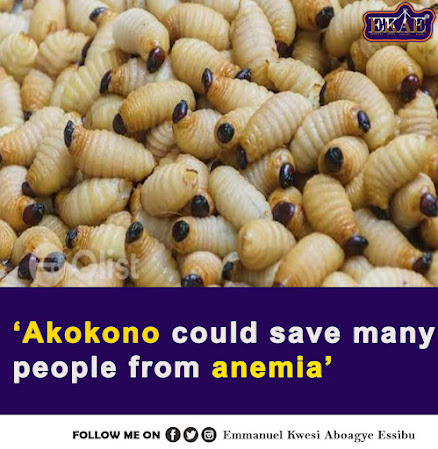Akokono could save many people from anemia
About 20% maternal deaths in Ghana are caused by iron-deficiency anaemia, while 76% of children aged under two are anaemic and more than four in 10 women aged 15 to 49 suffer from low blood iron levels, according to the 2014 Ghana Demographic Health Survey.
Aspire founded by student from McGil University in 2013, promoting Akokona says, Akokono can provide 96% of the recommended daily allowance of iron compared with only 21% found in every 100g of meat. The UN's Food and Agriculture Organization says insect contain six
times more calcium than meat, too.
As human settlements are severely reducing farmlands for rearing animals drastically, farming of insects like the palm weevil larvae has been gaining prominence in recent times.
Insects are used as a source of protein in some cultures across the world, but few farmers, like Akokono house, in Ghana are engaged in this type of farming.
Akokono, is a great source of protein and also easy get as compared with livestock that take months and years to reach maturity for consumption.
Akokono is not sold on the market, as they are taken on the farm from dead palm trees which palm wine has extracted from.
Reseach has shown that palm weevil larvae have a higher protein content than eggs, and more importantly, they are easy to breed. It is interesting how Akokono House is tacking the challenge of availability, since most people who would want to patronize the larvae are currently in the cities.
Akokono house, for instance uses technology and tradition to farm them (palm weevil larvae). The technology is devoid of palm trees but have found out what makes them grow in the palm and give it to the larvae, thus they feed on it to grow. And, in this case, they can get access to it every time.




Comments
Post a Comment